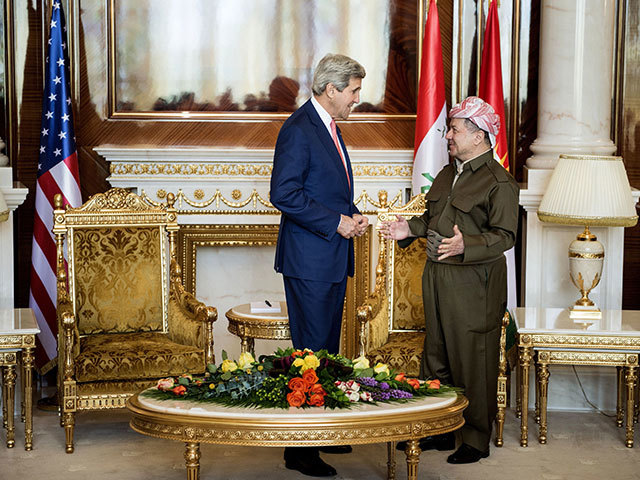
US Secretary of State John Kerry met with leaders in the capital of Iraq’s semi-autonomous Kurdish region in his bid to prod the country to unite against an al-Qaeda offshoot that has seized control over swaths of the country.
In his second visit to Iraq in as many days, Kerry met in Erbil today with Massoud Barzani, president of the Kurdistan Regional Government, and other Kurdish leaders. He brought the same plea for cooperation he delivered yesterday to politicians in Baghdad, including Prime Minister Nouri al-Maliki, a Shiite, and Sunni officials, as Iraq works to form a new government after April elections.
Kerry told CNN in an interview after the meeting that Barzani “made it clear that he wants to participate in the process, that he wants to help choose the next government” of Iraq.
The US says sectarian divisions have helped the al-Qaeda offshoot, the Sunni Islamic State in Iraq and the Levant, consolidate its control over areas of Iraq, OPEC’s second- biggest oil producer, since capturing Mosul on June 10.
Kerry’s visit to Baghdad yesterday added to US pressure on Iraqi leaders, including Maliki, who has been accused of sidelining the country’s Sunni minority and the Kurds, to form a more inclusive government.
Kerry, after meeting with Maliki and others, told reporters that Iraq faces an “existential threat.”
He said he wanted the Kurds to put aside their differences with the central government in Baghdad to help counter Isil’s advance even as the turmoil has rekindled long-standing Kurdish hopes for independence.
While the insurgents’ rapid-fire gains across northern Iraq caught the Iraqi military off guard, the Kurds’ Peshmerga force has defended Kurdistan and extended control into disputed areas including Kirkuk, the largest northern oil field, to which they have long staked a claim.
Kerry thanked the Kurds for “security cooperation” and praised the Kurdish forces as “really critical in helping to draw a line with respect to Isil.”
The latest captures for the Sunni militants include the Traibil crossing post with Jordan and the Al-Waleed entry into Syria that are also in the hands of Isil’s tribal allies.
Jordan sent tanks and troops to reinforce its border with Iraq, Al Arabiya television said.